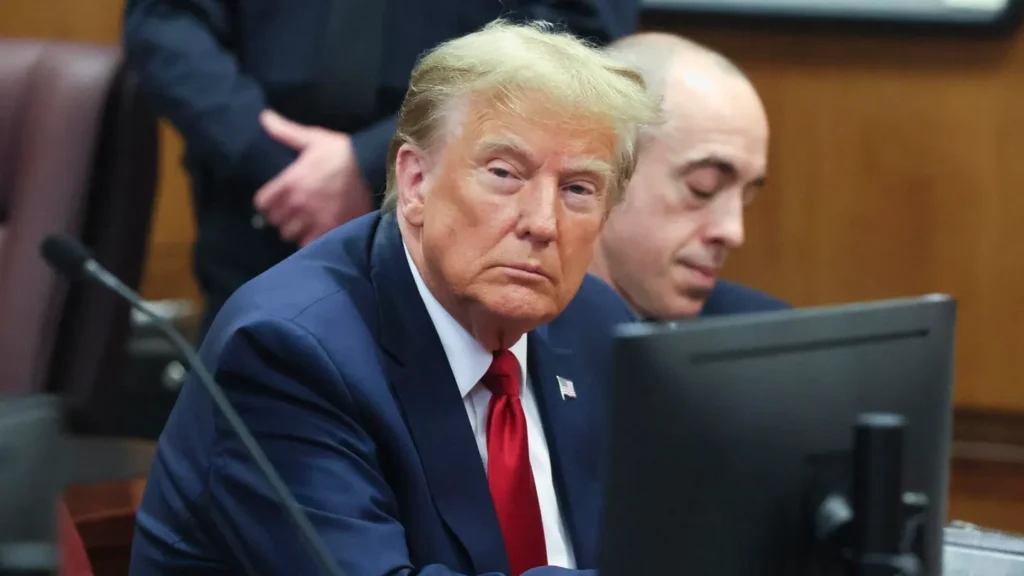Mar 7, 2024,08:19am EST
The Supreme Court has scheduled oral arguments for April 25 to discuss whether former President Donald Trump holds immunity from criminal prosecution, as announced on Wednesday. The timing coincides with the impending conclusion of criminal charges against the ex-president, although numerous cases confront potential extensive delays.
Here’s a breakdown of the timeline and key developments:
March 25: Trump’s trial is set to commence in the Manhattan district attorney’s criminal case, accusing him of falsifying business records related to “hush-money” payments made during his 2016 campaign. The trial, comprising 34 felony counts, is confirmed to begin despite Trump’s efforts to dismiss the charges.
April 25: The Supreme Court will engage in oral arguments regarding federal charges against Trump for attempting to overturn the 2020 election. Justices will examine whether former presidents are exempt from prosecution based on alleged official acts performed while in office.
July – August: The Department of Justice (DOJ) proposes a July trial date for Trump’s federal case concerning the mishandling of White House documents. However, Trump seeks to delay the trial until after the November election or schedule it for August. Judge Aileen Cannon, a Trump appointee, is yet to determine the trial date and whether witness names should be disclosed.
July – October: The trial date for Trump’s federal election case remains uncertain pending the Supreme Court’s ruling, expected before late June. Legal experts anticipate the trial to occur between late July and October, possibly extending beyond the 2024 election. The case, entailing four felony charges, revolves around Trump’s efforts to overturn the 2020 election results.
August 5: Fulton County, Georgia, district attorney Fani Willis proposes August 5 as the trial start date for the criminal case against Trump and his associates, involving 13 felony charges related to the alleged racketeering conspiracy to overturn the 2020 election. Trial dates are yet to be finalized amid potential disqualification concerns involving the district attorney.
WHAT TO WATCH FOR: Trump faces the prospect of significant penalties, including lengthy prison terms and substantial fines, across multiple criminal cases. The charges against him could result in a combined maximum prison sentence of 717.5 years and fines amounting to $11.2 million. Moreover, civil lawsuits from Capitol police officers and Democratic lawmakers seek to hold Trump accountable for his role in the January 6 events.
TANGENT: The start of 2024 witnessed pivotal court proceedings against Trump, including civil fraud and defamation trials. While the Supreme Court upheld Trump’s presence on state ballots, civil trials concluded with substantial penalties, with Trump ordered to pay hefty sums.
BIG NUMBER: Trump faces over $540 million in civil judgments, significantly surpassing his estimated assets of $413 million. As deadlines approach, Trump must address the financial obligations resulting from the judgments.
WHAT WE DON’T KNOW: The potential impact of pending cases on the 2024 election remains uncertain. Despite attempts to delay trials, convictions could influence voter perceptions. However, constitutional provisions do not disqualify convicted felons from seeking presidential office.
CHIEF CRITIC: Trump vehemently denies all charges and dismisses them as politically motivated. He maintains his innocence, labeling the cases as “witch hunts” and emphasizing his commitment to exposing alleged election irregularities.
KEY BACKGROUND: Trump faces 91 criminal charges across four cases, marking the first instance of a sitting or former president facing felony charges. Legal consequences ensued in 2023, including defamation rulings and civil fraud indictments, indicating the culmination of long-standing investigations into Trump’s conduct.

